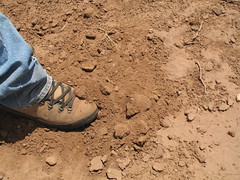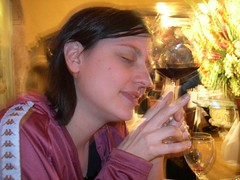Cork and Demon's Take on Terroir, Appellation, and All Things Split-Haired

I got an email from a reader asking my opinion about terroir vs. appellation, and it was getting to be such a long email, I just decided to make it a post.
To be honest with you, the terroir vs. appellation arguement is a big fat word-mincing party as far as I'm concerned. Terroir is a French word which doesn't fully translate into English, but basically means all of the agricultural elements that are in play in any given specific vineyard or area, including the makeup of the soil and the microclimate. Appellation is a specific place on a map where there are such specific elements in play. Blah, blah, blah. It's like this organic farmer I met recently who insisted that he was by no means a "enviornmentalist" (dirty word) but rather a "conservationist" (acceptible term). WTF ever.
There are a set of elements that influence what wine tastes like in the glass. Some of them are completely out of the control of the winemaker, and some are within his control. It's a long ass list:
- Grape Variety
- Clonal Variety
- Soil Type and quality
- Soil Makeup
- Macroclimate (the weather patterns in Southern California)
- Microclimate (the weather patterns in the Santa Maria Valley)
- Vintage Weather (including degree days and rainfall, frost, etc.)
- Vineyard Management (including vine placement, pruning, growing techniques, canopy management, etc.)
- Disease damage/fungal damage
- Harvest timing, which breaks down into several factors, but those that influence flavor are:
- Degrees brix at harvest (amount of sugar in the berries at harvest. This is something that is not only a choice of the winemakers depending on what style they're wanting to make, but also partly dependent on the climate the grapes are grown in, i.e., a hotter climate makes for faster ripening fruit)
- Physiological ripeness at harvest (whether all the elements of the grapes themselves are physiologically ripe. In a hotter climate, a grape berry can be fat with ripe sugars before the skins and pips (seeds) have yet reached physiological ripeness. This can make a wine more tannic or alter the flavor.)
It's just now, after all this, that we even get to the actual winemaking part. The variables there are equally extensive, should the winemaker so choose to use them. They include, but aren't limited to:
- Length of fermentation/residual sugar
- Type of yeast used (or not used, if wild yeast is what they're depending on)
- Type of fermentation container (stainless steel? Oak? What kind of oak? How old is the oak barrel? How big?)
- Secondary fermentation, or not
- Use of techniques such as microoxygenation (did I spell that right?), osmosis, filtering (and what type of filtering), racking, gravity flow, et cetera
- Use of colorings, flavorings, and other additives
- Aging, for how long, at what point, and in what container
- And after all that, how the wine is marketed to you. Don't laugh. People love themselves some critters. And for many, if there's a critter on the label (kangaroo, emu, penguin, eagle, bear, dog, rhinocerous, cherub, lobster, or what have you) it tastes better.
But don't get me wrong. The word terroir is under fire these days for both good and bad reasons. The good: it is, in fact, used ad nauseum to glorify many an ad campaign here in America, and has been used for centuries in Europe to create an expectation of quality regardless of all these other factors that could have gone wrong. The bad reason: terroir, if you'll indulge the word, encompases some of the most important variables in the flavor of complex and interesting wine. There is no doubt that soil composition, for instance, has an effect on the flavor and longevity of wine. BUT... this is contingent upon whether or not the winemaker has chosen to allow those secondary flavors to remain. Many fruit forward style wines have so much big fruit at the front of the palate that it is very difficult to find terroir-influenced flavors. That is a style choice that both the winemaker and the grower can make if they wish.
So for me, terroir vs. appellation = who cares. When boiled down to their most honest meanings, they are both very important, and one does not occur without the other. I hereby replace both words with the neologism plantiness.
Clinkies.





5 Comments:
Sounds like a War on Terroir.
I don't understand why you'd think so. On the contrary, I'm saying that terroir, in the true sense of its original meaning, is very important, but like many terms in both wine and politics, it has lost its meaning by being overused and misunderstood. That's just the truth.
I am just really getting into wine and your pages have led me to new wines to try and now learning about terroir and appellation. Great pages. Keep 'em up Taj! I love your Tour du Ouest.
Appellation and and terroir do not mean the same things. An Appellation in France (or DOC in Italy, or DO in Spain, or AVA in the USA and so on...) is the name of a definable region, for example Bordeaux, Napa or Chianti. Regions do not have terroir, but vineyards do. Terroir can only refer to specific vineyards, which may or may not be covered by an Appellation. As well proven in Burgundy, a change of a few meters can produce a totally different wine, this has nothing to do with the Appellation, but everything to do with terroir. Clos Vougeot is a Grand Cru Appellation, but is made up of many terroirs.
Looking to buy wow GoLd, or sell WOw GOld to reliable customers. welcome to WOw golD,buy woW goLD,sell WoW gold .For more information of wOw Gold, please visit a the super wow gold website specialized in selling WOw gold. We will serve you with cheap woW gOld, cheap WOw gold. Welcome to WOw gold,
you can get cheapest WOw gold frome here.
Post a Comment
<< Home